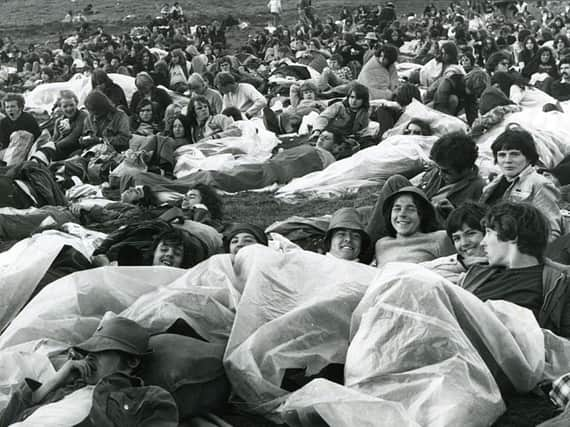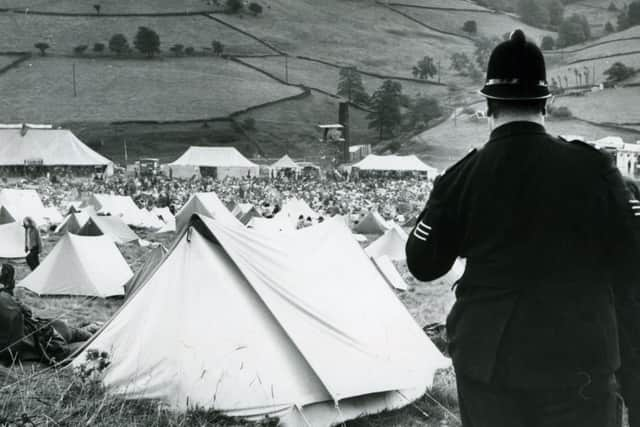Krumlin - the story of the biggest pop festival you've probably never heard of 50 years on


He was referring to the Krumlin Pop Festival. Connolly was among the performers at the ill-fated event in August 1970, held on a windswept tract of land in the Pennine hills a few miles from Halifax.
It was supposed to be a three-day festival featuring some of the biggest names in folk and pop of the day but ended in disaster. It’s a story of big ambitions, forged tickets, gatecrashers and atrocious weather.
Advertisement
Hide AdAdvertisement
Hide AdIt’s also the subject of a new book which comes out this week to coincide with the 50th anniversary.


The story of Krumlin began when an enterprising pair, Derek McEwen and Brian Highley, both in their 20s, came up with the idea of a music event. Brian was the landlord at the time of a little pub in Millbank, near Halifax, and his friend, Derek, managed a couple of folk groups. “We had a folk club in the pub and we had bands like the Humblebums, which included Gerry Rafferty and Billy Connolly, in to play, and we decided it would be nice to have a little folk festival in the field below the pub, but the local farmer turned us down,” says Brian.
Undeterred, they decided to look elsewhere and began dreaming of something bigger. They arranged to rent 12 acres of land in Krumlin, near Barkisland, for the weekend of August 14-16.
So they had a site, now they just needed to sort everything else. “I’d organised college functions but nothing like this. We were having to get roads built and streets diverted and electric mains put in.”
Advertisement
Hide AdAdvertisement
Hide AdThese days rock music festivals are big business but 50 years ago it was a different story. “The first Glastonbury came after us and nobody had seen the Woodstock film, so we didn’t know much about Woodstock at all.”
They started selling tickets at just three shillings (15p) to help pay for some publicity. “We quickly put them up to 30 shillings and as soon as we started booking major bands it was 50 shillings,” says Brian.
By the time the festival started on the Friday they had assembled an impressive line-up that included Ralph McTell, Pentangle, The Pretty Things, Fairport Convention and Sandy Denny.
“We did have an exclusive with Pink Floyd. They were due to play either the Saturday or the Sunday, and we changed it to the Sunday which was a mistake. So we should have had Pink Floyd.”
Advertisement
Hide AdAdvertisement
Hide AdThe headliner on the first night was a young Elton John. “We paid him 75 quid,” says Brian.
By this time, though, alarm bells were starting to ring. They had reportedly sold 16,000 tickets but this wasn’t reflected in the money coming in, plus they had banked on selling more tickets to break even. “On the Friday, we only took £4,000 at the gate and at that point it became clear there were forgeries.”
Brian contacted Pink Floyd and told them not to travel to Yorkshire because he knew by this point that they couldn’t afford to pay them. “They were one of the few bands that had not been paid up front.”
With forgeries doing the rounds and security lax the festival began to unravel. And just when things could scarcely get any worse the weather turned.
Advertisement
Hide AdAdvertisement
Hide AdA storm hit the site on the Saturday evening as the heavens opened. Many people were sleeping in thin plastic bags which offered little protection from the wind and rain and the organisers were forced to pull the plug around midnight.
“The temperature dropped to just above freezing and there were thousands of cases of exposure so we just had to stop everything,” says Brian. “On Sunday they were warning people on the radio not to travel because it was a disaster area and they needed the roads to get ambulances in and out.”
The police and even the Army were called in to search the site to make sure there were no bodies, which thankfully there weren’t.
For Brian, in particular, the festival had been disastrous. It cost in the region of £60,000 to put on and the organisers were left owing £30,000.
Advertisement
Hide AdAdvertisement
Hide AdDespite losing his pub he bounced back later moving to Devon making his name writing questions for Trivial Pursuit for over 25 years.
He has also written a foreword to Ben Graham’s new book – Pink Floyd Are Fogbound In Paris: The Story of the 1970 Krumlin Pop Festival.
Ben grew up in Sowerby Bridge and knew about the festival. “It was a bit of a local legend when I was growing up. There was this myth that there was this big festival and a huge storm destroyed it. Nobody ever seemed quite sure exactly who played, partly because all the bands booked for the Sunday didn’t play.”
He says the festival was beset with problems from the outset. “Nobody could prepare for the weather and that was what actually stopped the festival from finishing, but the damage was done with all the forged tickets that the promoters didn’t know about until it was too late.”
Advertisement
Hide AdAdvertisement
Hide AdBen says some performers had already been paid but others hadn’t. “Once it became apparent there was no money then it descended into chaos. Running orders got muddled and everyone went on very late. Bands were drinking in the backstage bar and going on anyway when they were drunk.”
Even so, he believes the pop festival is more than just a cautionary tale. “Krumlin was definitely in the infancy of rock music festivals in this country, and nobody knew how it was done so it was quite a bold move. There was no template for how to build an outdoor stage, they had to get a scaffolding firm in from Wakefield to build something,” he says.
“When I was growing up in the Calder Valley there was nothing really happening in terms of music, but this shows there was actually people trying to do cultural events on a big scale, and in the past few years there’s been a bit of a resurgence with several bands from Halifax and Hebden Bridge getting a bit of national attention. So now Krumlin seems less like a disaster and a lesson in why you shouldn’t try to put on a music festival on the Pennine moors, and more of a precursor of the musical revival we’ve had since.”
Brian, too, is able to look back at Krumlin with a certain amount of affection. “If we did something that’s still remembered 50 years later then maybe we did actually achieve something, even if it did end up being known as a disaster.”
Advertisement
Hide AdAdvertisement
Hide AdAnd as for The Big Yin not getting paid. “I think I owe Billy Connolly 25 quid…”
Pink Floyd Are Fogbound In Paris: The Story of the 1970 Krumlin Pop Festival, is published by Bleeding Cheek Press on August 14.
Brian Highley has written an autobiography called In Pursuit of Trivia.
Some big names and some bigger ones that got away
Posters for the Krumlin Pop Festival promised some big names would be on the bill and many were, including the likes of The Pretty Things, Fairport Convention, Elton John and Alan Price.
Advertisement
Hide AdAdvertisement
Hide AdSome of the moves for big names didn’t come off. Brian Highley says they tried to get Simon and Garfunkel but were quoted a fee way above their budget.
He claims he had a verbal agreement with The Who’s management but they then agreed for the band to play at The Isle of Wight Festival that year.
But writer Ben Graham feels the bill for Krumlin was still an impressive one. “If you look at the line-up it’s what we might today call a boutique line-up, they certainly weren’t second stringers.”
Editor’s note: first and foremost - and rarely have I written down these words with more sincerity - I hope this finds you well.
Advertisement
Hide AdAdvertisement
Hide AdAlmost certainly you are here because you value the quality and the integrity of the journalism produced by The Yorkshire Post’s journalists - almost all of which live alongside you in Yorkshire, spending the wages they earn with Yorkshire businesses - who last year took this title to the industry watchdog’s Most Trusted Newspaper in Britain accolade.
And that is why I must make an urgent request of you: as advertising revenue declines, your support becomes evermore crucial to the maintenance of the journalistic standards expected of The Yorkshire Post. If you can, safely, please buy a paper or take up a subscription. We want to continue to make you proud of Yorkshire’s National Newspaper but we are going to need your help.
Postal subscription copies can be ordered by calling 0330 4030066 or by emailing [email protected]. Vouchers, to be exchanged at retail sales outlets - our newsagents need you, too - can be subscribed to by contacting subscriptions on 0330 1235950 or by visiting www.localsubsplus.co.uk where you should select The Yorkshire Post from the list of titles available.
If you want to help right now, download our tablet app from the App / Play Stores. Every contribution you make helps to provide this county with the best regional journalism in the country.
Sincerely. Thank you.
James Mitchinson
Editor
Comment Guidelines
National World encourages reader discussion on our stories. User feedback, insights and back-and-forth exchanges add a rich layer of context to reporting. Please review our Community Guidelines before commenting.